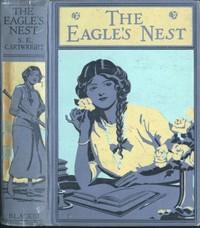Read this ebook for free! No credit card needed, absolutely nothing to pay.
Words: 29269 in 14 pages
This is an ebook sharing website. You can read the uploaded ebooks for free here. No credit cards needed, nothing to pay. If you want to own a digital copy of the ebook, or want to read offline with your favorite ebook-reader, then you can choose to buy and download the ebook.
own tabby, with wide black stripes, and was given a blue ribbon, the mark of the first prize. He took it all very calmly, as much as to say, "You couldn't do anything less for one with such a name as mine."
But even "Grover Cleveland" was not so aristocratic-looking as "Grover B.," from Philadelphia. His short-haired coat was as white as the stone door-steps of the houses in his native town, and--think of it--his mistress values him at 00! So well brought up is he that he sits at the table with his master and mistress in a high chair and feeds himself with his paw. His master says that he eats more quietly and gracefully than their little nephew of five years, who, when he spills his bread and milk, is told he can profit by "Grover's" example. So fond of him is his master that his head appears on all his business paper and envelopes, so that "Grover B." is known all over the world, and, through his pictures on his master's envelopes, has travelled more extensively than almost any other cat.
An even more wonderful short-haired cat was "Mittens," who has actually been trained to love and live with birds. "Mittens" is a great deal of a swell. His grandfather was a pure-blooded Maltese, and his great-grandmamma was a very haughty Angora. All the traditions in his family prompted him to consider birds as his natural prey and dogs as his enemies. When he came to his present mistress, Mrs. M. L. Ponchez, the latter had two Yorkshire terriers, a parrot, eight canaries, a red-bird, and several chameleons, and of course she thought it would be pretty difficult for "Mittens" to live in peace with all these other pets. She thought she would try to teach him to be friendly to the birds and dogs, and this is what she did.
She first kept all of her pets a day without food, and then the next day placed the cat between the dogs while she fed him his breakfast. After that the cat and the dogs became such good friends that they all slept together. At the next meal she took one of the canaries, put him on her finger, and petted him while she held "Mittens" in her lap and fed him. This she did several times, and then let all of the birds fly around the cat. The latter never attempted to touch one, and frequently to-day you may see "Mittens" slumbering peacefully before the fire, with a canary nestled on the soft fur of his back.
While there were many more short-haired cats on exhibition for prizes, the long-haired ones created more attention because they are much less common. They had a separate room to themselves upstairs, and a band of music played for them lest they should forget that many of them were descended from cat emperors and princes in the far-off East. There was "Ajax," a white Angora, with firm mouth and keen eyes, his fluffy white mane looking like a lion's, every inch of him a king. There was "Paderewski," blue-ribboned, with longer and thicker hair than the famous musician whose name he bears. Near by an interested crowd watched "Ellen Terry" and her seven kittens. "Ellen" is a large white and orange Angora, and very cozy were she and her kittens in a basket lined with yellow silk and trimmed with dotted muslin. Her manners were perfect, for whenever her cunning little kittens were caressed she showed no surprise, but looked on with calm maternal pride.
Just to show by contrast how very aristocratic these long-haired cats were, six or eight lost cats from the Shelter for Animals were exhibited near the haughty Angoras. All but one looked sadly out of place. They were thin, their fur was uneven, and the disdainful sniffs which their Persian and Angora neighbors gave them made them feel very miserable indeed. But one of them, though, a short-haired cat, looked as if his grandfather had been a somebody in the cat kingdom, and he seemed to say,
"Though appearances are against me, please don't think that I belong to this vulgar herd of tramp cats."
And he was vindicated, for the third day of the show a little girl came rushing over to the cage with a glad cry of recognition, which the cat immediately responded to by joyful purring. The cat had been lost for over two weeks, and now as his young mistress took him away he looked back at his proud long-haired neighbors with a smile, which meant,
"Ah, you see I'm somebody, after all!"
Perhaps the readers of the ROUND TABLE would like to know whether their cats and kittens are "somebody" or not, whether they are pure-blooded examples of the classes to which they belong. It is quite simple. A prominent doctor, who knows more about cats than almost any other man in the United States, says that in judging a cat the first thing to be considered is its general symmetry.
"The body ought to be long and slenderly shaped, like that of a tiger. The eyes should be of a correct shade; for instance, a cat that is white should have blue eyes, a black cat yellow eyes, and so on. The eyes, too, should be round and full. The color of a cat is important, and is the key to its character. A cat of one color should have no other hue in its coat. The most rarely marked cat is the tortoise-shell, uneven patches of red, black, and yellow, equally distributed over the body. In the tabbies the dark markings should be in direct contrast with the light, gray or brown being marked with black, while blue is marked with some darker shade, and yellow with red."
So successful was this first cat show that it is almost settled that another one will be held next fall. A cat club is to be formed, as exclusive as some of the kennel clubs to which the cats' canine enemies belong. So that hereafter when a proud-looking Angora goes to call on a Maltese friend, the question no longer will be: "How many birds have you killed lately?" or, "How do you find your milk these days?" But as the pussies purr in good-fellowship together, you will hear them ask each other , "Are you going to the club this evening?" and "Shall I see you at the 'show' next fall?"
Free books android app tbrJar TBR JAR Read Free books online gutenberg
More posts by @FreeBooks

: The Eagle's Nest by Cartwright S E Rainey W William Illustrator - Children Juvenile fiction; Tree houses Juvenile fiction










